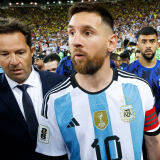
The 2022 World Cup's knockout stage is in full swing with the round of 16 ending on Tuesday and the quarterfinals beginning on Friday. As a result of these knockout stage games being win-or-go-home scenarios, they can last much longer than expected, especially considering the new interpretation of stoppage time, which has resulted in much more added time at this tournament. After Japan vs. Croatia on Monday, Tuesday's Morocco vs. Spain battle was the second game that was tied at the end of the regular time (90 minutes) and needed more time to know who was going to the quarterfinals of the tournament with both games ultimately ending up going to penalties.
Here's what you need to know if a game ends up being tied after regulation.
What happens if a match ends tied?
If a match ends tied at the end of the regular time, there will be 30 more minutes of extra time divided into two halves of 15 minutes. If a team scores, play still continues as there is no sudden death. The 30 complete minutes must be played. If the extra time also ends tied, the game goes to penalties.
Each team need to take five penalties and whoever scores more will win the match. If at the end of the five penalties we still don't have a winner, the penalties will go on until one of the two sides miss it and the other team scores. At that point, we will finally have a winning side.
How many substitutions are allowed?
Since 2020, in most soccer competitions, there are five substitutions allowed that can happen in three different time slots of the matches. For instance, it's not possible to make five changes in four different moments of the game, while it's possible to do it in one, two or three different moments. When the game goes to the extra time, managers have one additional substitution and one additional time slot to make their final change. At the end of the game, a coach can make up to six substitutions in four different time slots only if the game goes to extra time.
What's new about stoppage time?
At the FIFA referees media day prior to the start of the FIFA World Cup Qatar 2022, the Chairman of the FIFA Referees Committee, Pierluigi Collina, gave notice that time lost due to different specific events that transpire during matches would be compensated for. The aim of this move was to increase the actual playing time: "The issue of matches with fewer than 50 minutes of actual playing time is something that has been going on for a while now," said Collina. "People want to watch football, more football. And we, FIFA and IFAB have been asked to do something about it for years."
Substitutions, which can now total ten during a match rather than the previous six, VAR checks and goal celebrations are other factors that result in a loss of actual playing time, and this time is now being compensated for. A good general example of a combination of these issues emerged during the opening Group B encounter between England and Iran, where an extra 23 minutes of stoppage time was applied across both halves.
"We had the Iran goalkeeper who got injured and was treated for about 11 minutes in total, and an England player with an injury that lasted three minutes," said Collina. "So 14 of the 23 minutes were for those two specific injuries. And it must be remembered that eight goals were scored, with their celebrations, plus one delay to restart of play due to a VAR check and one on-field review. There were a lot of incidents that caused such a large amount of added time".





















